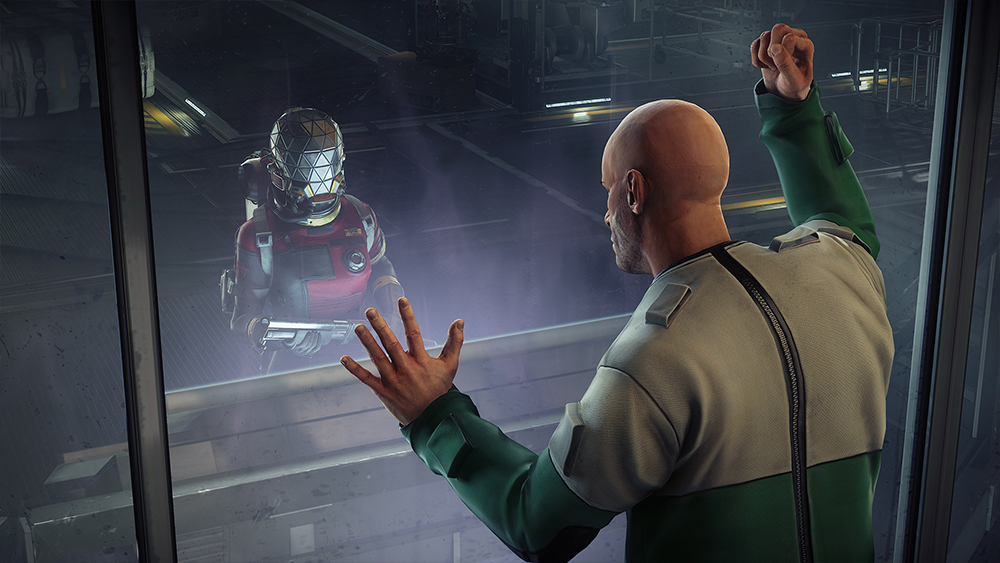Part first-person action game, part psychological and survival horror, Prey puts players aboard the Talos I space station, which has been overrun by aggressive aliens. Not only are these aliens dangerous, but they possess a variety of abilities that range from mimicking inanimate objects to releasing psychic blasts. Players must make their way through the station, surviving however they can, while unraveling the mystery behind what’s going on. To help, they’ll be able to craft gadgets and weapons while acquiring some powers of their own using neural mods.

That’s a lot to take in, and even Raphael Colantonio, creative director for Prey at Arkane Studios, admitted, “From a distance, it’s a complicated game because there are so many aspects to it. It’s richer than just being a first-person shooter. The simplest way I would describe it is that it’s mix of an FPS and RPG, with a strong simulation layer underneath that allows you to replay in different ways. As for the plot, you play as Morgan Yu, and you are the subject of experiments where things have gone wrong. You find yourself on a space station infested by aliens and you have to escape.”
Talking with AListDaily from a demo event in New York City, Colantonio explained how Prey compared to games such as BioShock or the more recently released Resident Evil 7. He said, “I think it’s more like BioShock than Resident Evil. We have some horror elements, but that’s not what the game is trying to do. It’s not trying to be a survival horror game—it’s more like a plain survival game where you have to escape this place. We’re not trying to creep you out with gore and horrific moments. Although there are horrific moments, the goal is to put you in a simulation where you get to explore this place and find the best way to survive.”
Although Prey is a wonderfully short and fitting title, it comes with quite a bit of baggage. An unrelated game with a very long development history (marked with multiple delays, cancellations and restarts) released in 2006, published by 2K Games. Years afterward, the license transferred to ZeniMax Media, and its subsidiary, Bethesda Softworks announced the development of a sequel in 2011, which was subsequently canceled. So, it came to a surprise to many longtime gamers when the new Prey was announced at E3 last year, and there was much speculation as to what it was about. We asked Colantonio if he thought the title created expectations for the game when it was first revealed.
“It’s hard for me to answer that precisely,” said Colantonio. “I think there has been a lot of confusion about Prey. In 1995, 3D Realms announced the development of Prey and this game never shipped. Then the Prey from Human Head [published by 2K Games] came out. Then they (Human Head Studios and Bethesda Softworks) announced another game (Prey 2), which had nothing to do with the first one and that didn’t happen. So, it’s been ten years since the last time a game called Prey released.”
Colantonio then explained what the title meant to Arkane Studios. “For us, it’s more like a theme that fit well with our game. I think that happens a lot in the movie industry, where you have ten movies with the same name but people don’t get so hung up on it. But I definitely think it will be a surprising game for a lot of people. I just hope that they’ll look at it with an open mind and won’t try to make connections with some other game that never shipped. It’s a new game and it’s its own thing.”
The problem that most horror games face is that players can only be afraid for so long. So what will be keeping players engaged with Prey throughout the entire experience? “I agree with that,” said Colantonio. “That’s why we usually say that we’re not a horror game, because horror games can be summarized with a monster in the closet analogy. For us, it’s more about the mystery behind the story and having players wanting to find answers. When a player finally finds the answer to a question, we start with another mystery, so they always want to know more. The horror is more of an aside than the goal, and I think that’s what keeps people engaged.”
As to whether Arkane Studios plans to extend the experience with DLC, Colantonio said, “Yes, absolutely. We don’t have any plans to announce yet, but we are working on a variety of things—including updates—to keep the game going.”
Colantonio then discussed maintaining a sense of mystery with the game when livestreaming is so popular and could potentially spoil the story. “That’s the world we live in,” said Colantonio. “I think some players will want to know as much as they can before they touch the game and some others will protect themselves from any kind of spoilers. As long as both are happy, it’s cool with us. The game tailors itself to how you want to play and the experience you want to have. So, even if you’ve seen someone else play, your experience will still matter and be different.”
Prey’s multiple endings and open-ended gameplay, with its variety of powers and different paths to discover, also engages players by encouraging replays. “It’s impossible to see all the alien powers in one playthrough,” said Colantonio. “So, you would have to play again and get different powers. Also, at some point, the story branches and you have choose between doing one thing or another thing. They’re mutually exclusive, so you can’t do both. So, replaying is a way to see what happens if you make a different choice. There are also a few other mutually exclusive quests that have nothing to do with the ending.”
A demo for Prey, which covers the opening hour, releases on April 27, giving players a taste of what is to come when the game releases on May 5. Colantonio sums up why gamers should be interested in surviving the halls of Talos I.
“They (players) should pick up Prey because they are going to go through a very engaging experience that will be their own,” explained Colantonio. “They can talk to their friends about it, but no two players will have exactly the same experience. Players will get to make up their own strategies, and the game will respond to what they do like in a simulation. That’s a very powerful, immersive media for people.”

